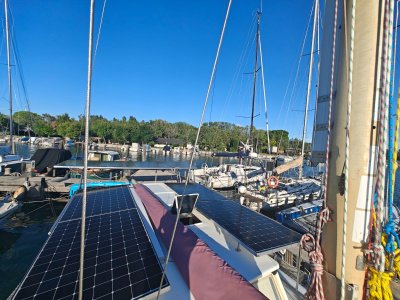Refueler
Well-Known Member
I guess no fridge then
Most boaters on forums like this are not long distance guys ... basically short dist to next pontoon - next port etc. So no need for large output panels ....
But in saying that - the 38 I have - the panel ahead of mast is estimated 40W - maybe 50W max ... its not new - has signs of age at corners ... serves 3 Lead Acids ... and according to previous owner - with reasonable up to 2 - 3 day sensible use - the domestics + solar maintains the fridge and general.
That I suggest is what many would look at ... but of course once the demand and lack of shore power comes in ... the output req'd shoots up dramatically.
When I saw the panel - I casually said to seller ... no fridge then ? His answer : Yes of course there's a fridge - whats' problem ?


